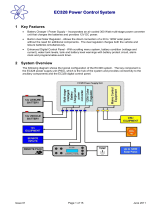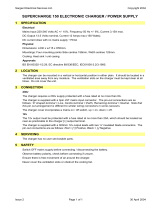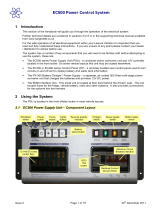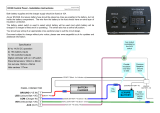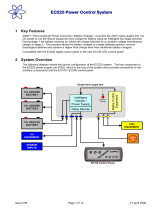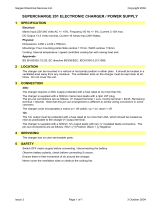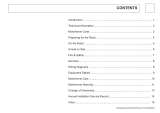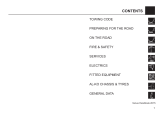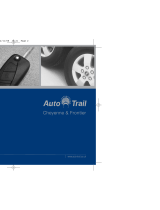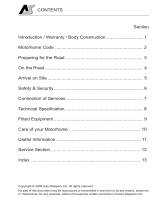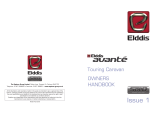Page is loading ...

Sargent Electrical Services Ltd. Copyright 2005
Issue 03 Page 1 of 11 12 May 2005
1 INTRODUCING THE EC200 ELECTRONIC CONTROL SYSTEM
With the use of new technology and an innovative approach to user interfacing, the EC200 Power
Control System provides a complete control solution for a wide range of leisure vehicles.
The microprocessor controlled digital system allows the user to control equipment and view / edit
system information from a user-friendly control panel that incorporates a liquid crystal ‘ALPHA-
NUMERIC’ display.
The built in ‘intelligence’ prevents over discharge of the vehicle battery, allows greater control of the
water system and has a built in alarm clock / event timer to control equipment in the absence of the
user. With the addition of an optional plug-in remote control pack the Power and Auxiliary functions
can be operated by a key fob controller.
The system meets relevant UK legislation, including the requirements of BS7671, EN1648-1 and -2.
Further technical data is contained in section 5.
2 SYSTEM OVERVIEW
The following diagram shows the components that make-up the EC200 system. The system basically
comprises a Power Supply and control Unit (PSU2007) that houses the Mains 240v protection
equipment, a 200 watt 12v charger / power supply, and power control / protection for the 12v
equipment. The PSU2007 is connected to a Digital Control Panel via a data cable.
PSU 2007
12v LEISURE
BATTERY
12v VEHICLE
BATTERY
REMOTE
PACK
12v
EQUIPMENT
240v
EQUIPMENT
240v
IN
SENSOR
INPUTS
CONTROL PANEL
EC200
TEMP
EC200 ELECTRONIC CONTROL SYSTEM
EC200

Sargent Electrical Services Ltd. Copyright 2005
Issue 03 Page 2 of 11 12 May 2005
3 POWER SUPPLY UNIT – SYSTEM OPERATION
3.1 INTRODUCTION
For the safe operation of all electrical equipment within your Leisure Vehicle it is important that you
read and fully understand these instructions. If you are unsure of any point please contact your dealer
/ distributor for advice before use.
The following diagram shows the PSU2007 layout.
POWER
SWITCH
RCD TEST
BUTTON
RCD
SWITCH
MCB
SWITCHES
POLARITY
INDICATOR
DC SUPPLY
FUSES
CHARGER
VENTILATION
WARNING
Under heavy loads the PSU2007 case will become hot. ALWAYS ensure the ventilation slots have a
clear flow of air. Do not place combustible materials against / adjacent to the PSU2007. The PSU will
shutdown if overheated and will restart automatically when cool.
3.2 MAINS CONNECTION
For your safety it is IMPORTANT that you follow these connections instructions each time your Leisure
Vehicle is connected to a mains supply.
A) Ensure suitability of the Mains Supply. Your Leisure Vehicle should only be connected to an
approved supply that meets the requirements of BS7671. In most cases the site warden will hold
information regarding suitability of supply. If using a generator you also need to comply with the
requirements / instructions supplied with the generator.
B) Switch the PSU2007 internal Charger unit OFF. Locate the red ‘Charger’ power switch on the
PSU2007 and ensure the switch is in the OFF (0) position before connection to the mains supply.
C) Connect the Hook-up Lead. Firstly connect the supplied hook-up lead (orange cable with blue
connectors) to the Leisure Vehicle and then connect to the mains supply.
D) Check Residual Current Device operation. Locate the RCD within the PSU2007 and ensure the
RCD is switched on (lever in up position). Press the ‘TEST’ button and confirm that the RCD is
turned off (lever in down position). Switch the RCD back to the on position (lever in up position). If
the test button failed to operate the RCD see section 3.4.
E) Check correct Polarity. Locate the ‘Reverse Polarity’ indicator on the PSU2007 and ensure that
the indicator is NOT illuminated. If the indicator is illuminated see section 3.4.
F) Check Miniature Circuit Breakers. Locate the MCB’s within the PSU2007 (adjacent to the RCD)
and ensure they are all in the ON (up) position. If any MCB’s fail to latch in the on position see
section 3.4.

Sargent Electrical Services Ltd. Copyright 2005
Issue 03 Page 3 of 11 12 May 2005
G) Turn the PSU2007 ON. Locate the red power switch on the PSU2007 and turn to the ON (I)
position. The switch will illuminate when turned on.
H) Check operation of equipment. It is now safe to check the operation of the 12v and 240v
equipment.
3.3 BATTERY
A) Type / Selection
For optimum performance and safety it is essential that only a proprietary brand LEISURE battery is
used with a typical capacity of 75 to 120 Ah (Ampere / hours). A normal car battery is NOT suitable.
It is recommended that the leisure battery is always ‘in circuit’ when the system is in use.
The battery feed is fitted with an inline fuse between the battery and the electrical harness, and is
usually located immediately outside the battery compartment or within 500mm of the battery. The
maximum rating of this fuse is 20A.
B) Installation & Removal
Always disconnect the 240v mains supply and turn the PSU 2007 charger switch to the OFF (0)
position before removing or installing the battery.
When connecting the battery, ensure that the correct polarity is observed (black is negative [-] and red
is positive [+]) and that the terminals are securely fastened. Crocodile clips must not be used.
WARNING
Explosive gases may be present at the battery. Take care to prevent flames and sparks in the vicinity
of the battery and do not smoke.
C) Servicing
Under normal circumstances it should not be necessary to remove the battery other than for routine
inspection of the terminals and “topping up” of the battery fluid where applicable. Please see
instructions supplied with the battery.
Note: Do not over-discharge the battery. One of the most common causes of battery failure is when
the battery is discharged below the recommended level of approximately 10.5v. Discharging a battery
below this figure can cause permanent damage to one or more of the cells within the battery.
3.4 FAULT TABLE
Fault Possible Cause Proposed Fix
Connecting lead between the site and
Leisure Vehicle not connected
Check and connect lead as per 3.2.C
Check also input connector at the base of
the PSU 2007
RCD switched off Reset RCD as per 3.2.D
RCD not operating correctly
Check supply polarity; if the RCD
continues to fail contact your Dealer, as
there is probably a wiring or equipment
fault.
MCB switched off
Reset MCB by switching OFF (down
position) then back ON (up position), if the
MCB continues to fail contact your Dealer,
as there is probably a wiring or equipment
fault.
No or deficient supply from site Contact site Warden for assistance
No 240 volt output
Other fault Contact your Dealer
No 240v supply Check all above
Charger not switched on
Switch charger switch on (I) position,
switch will illuminate
No 12 volt output
Battery not connected and / or charged Install charged battery as per 3.3.B

Sargent Electrical Services Ltd. Copyright 2005
Issue 03 Page 4 of 11 12 May 2005
Power switch on control panel not
switched to ON
Turn power on at control panel
Battery flat / Battery fuse blown
Recharge battery, check fuses, check
charging voltage is present at battery
Fuse blown
Check all fuses are intact and the correct
value fuse is installed as per fuse table
shown in 3.5
Equipment switched off / unplugged
Check equipment is switched on and
connected to the 12v supply
PSU overheated / auto shutdown
operated
Reduce load on system. Allow PSU to
cool down. PSU will automatically restart
when internal temperature is below 35° C
Other fault Contact your Dealer
Control Panel has no display
Check batteries, turn PSU2007 charger
switch on, and ensure mains supply is
connected.
Check control panel connecting lead at
PSU2007 and behind Control Panel
Contact your Dealer
12v Power turns off
Battery save feature has operated to
protect the Vehicle battery and the Leisure
battery is flat (see section 4.4)
Engine has been started, all equipment
has been disconnected to meet EMC
requirements
Control Panel display corrupt / erratic
function
Observe control panel handling
instructions
Reboot control panel by removing control
panel bezel, removing two fixing screws,
and unplugging the control panel
connecting lead. Wait 30 seconds then
reconnect and re assemble.
(Alternatively, turn PSU off, remove
leisure battery fuse(s) and remove vehicle
supply fuse [located in 4-way fuse box
under bonnet])
Control Panel contrast poor
Observe control panel handling
instructions
Remove control panel as above but do not
unplug. Carefully adjust contrast preset
on back of control panel using jewellers
screwdriver
Control Panel
Problems
Control Panel current reading incorrect
Contact dealer for current calibration
process

Sargent Electrical Services Ltd. Copyright 2005
Issue 03 Page 5 of 11 12 May 2005
3.5 FUSE / MCB TABLE
WARNING
When replacing fuses always replace a fuse with the correct value. NEVER replace with a higher value /
rating as this could damage the wiring harness. If a replacement fuse ‘blows’ do not keep replacing the
fuse as you could damage the wiring harness. Please contact your dealer.
Fuse Rating Fuse Colour Wire Colour Description
1 15 Amps Blue Slate Front Lights
2 15 Amps Blue Pink Rear Lights
3 10 Amps Red Yellow / White 12v Sockets
4 10 Amps Red Black / tracer Fans
5 5 Amps Tan Yellow / Green Heater / Hob / Other Ignitions (if fitted)
6 5 Amps Tan Slate / Red Aux / Awning Light
7 10 Amps Red
Green / tracer
Purple
Water Pumps / Toilet
8 20 Amps Yellow * Charger (internally connected)
Battery 20 Amps Yellow Brown / Blue Fuse remotely located near battery
MCB Rating Wire Colour Description
1 10 Amps White 240v Sockets
2 10 Amps White (Yellow for heater) Extra 240v Sockets / Heater
3 6 Amps Black (Blue for water heater) Fridge / Water Heater / 12v Charger
(internally connected)

Sargent Electrical Services Ltd. Copyright 2005
Issue 03 Page 6 of 11 12 May 2005
4 CONTROL PANEL OPERATION
4.1 Layout and Buttons
The following diagram shows the control panel layout.
POWER
ON / OFF
SCROLL
UP /
ADJUST
SELECT
AUXILIARY
ON / OFF
PUMP(S)
ON / OFF
BATTERY
SELECT
SCROLL
DOWN /
ADJUST
INDICATOR
LAMPS (x4)
2x16 LCD
DISPLAY
Note: to remove the decorative bezel, pull down and lift forward as indicated by the blue arrows.
Item Function Options / Notes
Power ON / OFF Use to turn the main power on and off
The adjacent LED is illuminated when
the power is ON
Battery SELECT
Use to select the Leisure or Vehicle battery
as the supply source
The adjacent LED is illuminated when
the VEHICLE battery is selected; by
default the Leisure battery is selected
and is indicated by the battery select
LED off.
Pump ON/ OFF
Use to turn the water pump(s) power on and
off (see section 4.3)
The adjacent LED is illuminated when
the pump power is ON
Aux ON / OFF
Use to turn the Auxiliary power on and off
(see manufacturers handbook for detail of
what items are operated by the auxiliary
function)
The adjacent LED is illuminated when
the auxiliary power is ON
Scroll UP ?
Use to scroll the display up (settings section
of the menu) (see section 4.3)
Scroll DOWN ?
Use to scroll the display down (readings
section of the menu) (see section 4.2)
Note: the menu screens operate in a
continuous loop, therefore you can use
either the UP or DOWN buttons to
move to any screen
Select ?
Use to select a menu item within the
settings section (see section 4.2 & 4.3)
Use to move to the next setting, when
entering alarm / event times
Note: the display backlight operated for approximately 6 seconds after any key press.

Sargent Electrical Services Ltd. Copyright 2005
Issue 03 Page 7 of 11 12 May 2005
4.2 Menu Functions - Readings section
Display Description Options / Notes
EC200
v1.1H
12:00
23.9°C
Main Control Panel display showing model
number (EC200), software version number
(v1.1), specification (H), current time (12:00)
and Internal temperature (23.9°C) in
centigrade
The addition of a asterisk (*) in
the top left of the display
indicates that the alarm is set
The addition of a hash (#) in the
top right of the display indicates
that the event timer is set
Leisure
Battery
12.5v (Good)
Voltage reading and battery condition
description for the on-board leisure battery
< 10.9 = (Poor)
10.9 to 11.8 = (Fair)
11.9 to 14.4 = (Good)
Vehicle
Battery
13.3v (Good)
Voltage reading and battery condition
description for the vehicle battery
See section 4.4 for details of the Vehicle
Battery save feature
< 10.9 = (Poor)
10.9 to 11.8 = (Fair)
11.9 to 14.4 = (Good)
Fresh Water
25% Full
Water level in the fresh water tank
(5 measurement levels)
0% < ¼ Full (Empty)
25% >= ¼ Full
50% >= ½ Full
75% >= ¾ Full
100% = Full
Waste Water
0% Full
Water level in the waste water tank
(2 measurement levels)
0% < ½ Full
50% >= ½ Full (optional)
100% = Full
External Temp
26.5°C
External temperature (in degrees centigrade)
as measured by the external temperature
probe
[Only available in H specification systems]
Battery
Current
5.4 Amps
Current (in Amps) being drawn from or
charged into the selected battery
[Only available in H specification systems]
Negative figure (-) = current
being drawn from the selected
battery
Positive figure = current being
used to charge the selected
battery
4.3 Menu Functions - Settings section
Display Description Options / Notes
Pump Select?
<Internal>
Shows the currently selected pump that will be
operated by pressing the pump on / off switch
(TAP symbol)
<INTERNAL> = The internal
pump will be operated by the
pump switch

Sargent Electrical Services Ltd. Copyright 2005
Issue 03 Page 8 of 11 12 May 2005
Use the select button (?) to change <EXTERNAL> = The External
pump will be operated by the
pump switch
<BOTH> = Both the Internal
and External pumps will be
operated simultaneously by the
pump switch
Water Tank
Fill?
<Start 1 Min>
Allows operation of the External pump for a
period of one minute (for filling the internal
tank from the external tank)
Use the select button (?) to START (or
STOP)
Will have no effect if the
External pump is already
switched on (see above)
Will not operate if the Internal
(Fresh) water tank is showing
100% Full
Clock Set?
12:00
Access to set the internal clock
Press the select button (?) to select HOUR
Use the up / down (??) buttons to change
Press the select button (?) to select MINUTE
Use the up / down (??) buttons to change
Press the select button (?) to exit
Please note the clock uses a
24 hour cycle
Alarm Set?
12:00
Access to set the alarm clock
Press the select button (?) to select HOUR
Use the up / down (??) buttons to change
Press the select button (?) to select MINUTE
Use the up / down (??) buttons to change
Press the select button (?) to exit
Please note the alarm uses a
24 hour cycle
Alarm = Off
Shows the alarm clock status (on / off)
Press the select button (?) to switch between
OFF or ON
The addition of a asterisk (*) in
the top left of the main display
indicates that the alarm is set
Set Event
Timer?
Access to set the event timer
Press the select button (?) to select HOUR
ON
Use the up / down (??) buttons to change
Press the select button (?) to select MINUTE
ON
Use the up / down (??) buttons to change
Press the select button (?) to select HOUR
OFF
Use the up / down (??) buttons to change
Press the select button (?) to select MINUTE
OFF
Use the up / down (??) buttons to change
Press the select button (?) to exit
[Only available in H and M specification
systems]
Please note the event timer
uses a 24 hour cycle
The event timer is used to
switch the control panel power
on and off in the absence of
the user / occupier.
See section 4.5 for further
details.
Event Timer
=Off
12:00 till
12:00
Shows the event timer status (OFF / ON) and
the current On and Off times
Press the select button (?) to switch between
OFF or ON
[Only available in H and M specification
systems]
The addition of a hash (#) in
the top right of the main display
indicates that the event timer is
set

Sargent Electrical Services Ltd. Copyright 2005
Issue 03 Page 9 of 11 12 May 2005
4.4 Warning Messages
Vehicle
Battery
Dangerously
Low
This WARNING display indicates that the
Vehicle battery voltage is low (10.9 volts or
less). The panel will beep for one minute and
then switch over to the Leisure battery to
prevent draining the Vehicle battery.
You can switch over to the
Leisure battery immediately
(and cancel the beep) by using
the battery selector switch
System
disabled
Engine
started!
This WARNING display indicates that the
system has been disabled because the vehicle
engine is running
EMC (Electro Magnetic
Compatibility) directive
89/336/EEC requires that
electrical accessories within the
vehicle are disconnected while
the vehicle is in motion
4.5 Event Timer example
The event timer is designed to allow the leisure vehicle user to turn the 12v power on or off (same as using
the control panel power button) without being in the vehicle. This allows lights or other equipment to be
turned on or off at a predetermined time.
Example - to turn on one interior light at 11.00pm
Ensure the clock is set to the correct time
Scroll to the ‘Set Event Timer?’ screen
Following the instruction in section 4.3, set the ON time to 23:00 and the OFF time to 24:00
Scroll to the ‘Event Timer=’ screen and select ON
Scroll to the main control panel display and ensure a hash (#) is displayed in the right of the display
Turn all lights and 12v equipment off in the vehicle except the light that you want the event timer to
automatically switch on
Turn the 12v power off on the control panel
Exit the vehicle
At 11:00pm (23:00) the control panel will switch the 12v power on and therefore any equipment that was left
switched on will be turned on. The 12v power will be switched off at Midnight (24:00).

Sargent Electrical Services Ltd. Copyright 2005
Issue 03 Page 10 of 11 12 May 2005
5 TECHNICAL DATA & APPROVALS
5.1 Outline Specification
INPUT 230v 230 Volts / 0 to 16 Amps + / - 10%
OUTPUT 230v
RCD protected, 3 x MCB outputs of 10, 10 and 6A via 2 x
9 way connectors
INPUT 12v 2 x 20A battery inputs via a single 6 way connector
OUTPUT 12v
20A total output via 4 x 16A switched channels protected
by 7 fused outputs via a 15 way connector
Integrated CHARGER
Input 110-240 Volts AC +/- 10%, Frequency 50 Hz +/- 6%,
Current 3.15A max.
DC Output 13.5 Volts nominal, Current 16 Amps max (200
Watts).
Signal INPUT
4 x Fresh water level, 2 x Waste water level, 1 x Engine
running via a 8 way connector
Fresh water negative sensed
Waste water negative sensed
Data IN / OUT
Data communication and power to Control Panel via 20
way IDC header connector
IP rating IP31
Operating
temperature
Ambient 0 to 35° Centigrade
PSU case temperature with full load 65° C Max
Automatic shutdown and restart
if overheated / overloaded
5.2 Dimensions
Overall size (HxWxD) 240 x 370 x 110mm Fixing centres 210 x 360mm
PSU2007
Clearances 75mm above, 20mm below, 50mm left & right Weight 3.2 Kg
Overall size (HxWxD) 80 x 193 x 40mm Fixing centres 175mm
CONTROL PANEL
Cut-out size (HxW) 60 x 165mm Weight 170 g
5.3 Approvals
System: BSEN 1648-1, BSEN1648-2 compliant, BS7671: 2001 compliant
Residual Current Device: RCD 40A 30mA trip to BS EN 61008
Miniature Circuit Breakers: MCB’s (10 & 6A) type C 6000A breaking capacity to BSEN 60898
Electro Magnetic Compatibility (EMC) directive 89/336/EEC
Integrated Charger: BS EN 60335-1/2.29, 89/336/EEC, IEC61000-3.2/3:1995, EMC certificate 5172TC 3
rd
party
tested.
5.4 Declaration of Conformity
Equipment: Leisure Power Control System Model name: PSU2007 / EC200 -STD / -DLX / -STD SW
I hereby declare that the equipment named above has been designed to comply with the relevant sections of the
above referenced approvals. The unit complies with all essential requirements of the Directives.
Signed: Name: Position: Manufacturer:
Date:
I L Sargent Technical Director
Sargent Electrical Services
Ltd
Unit 39, Tokenspire
Business Park
Woodmansey
Beverley
East Yorkshire
United Kingdom

Sargent Electrical Services Ltd. Copyright 2005
Issue 03 Page 11 of 11 12 May 2005
5.5 Electrical Connection
MCB 1
MCB 3
MCB 2
LIVE
EARTH
NEUTRAL
INPUT
OUTPUTOUTPUT
LIVE
EARTH
NEUTRAL
Note: both 9
way
connectors
are identical
View looking into PSU
230 Volt
51 2 3 4
6 7 8 9
11 12 13 14
10
15
551 2 3 4
6 7 8 9
11 12 13 14
10
15
A B C
D E F
INPUT
OUTPUT
Rear Lights6Vehicle Batt.B
Fire Ign.15Int Pump4
Fans14Radio3
Auxiliary13<Spare>2
Front Lights12Hob Ign.1
Front Lights11
12v Sockets10EarthF
<Spare>9Vehicle BattE
Toilet Pump8Leisure BattD
Rear Lights7EarthC
Ext Pump5Leisure Batt.A
Rear Lights6Vehicle Batt.B
Fire Ign.15Int Pump4
Fans14Radio3
Auxiliary13<Spare>2
Front Lights12Hob Ign.1
Front Lights11
12v Sockets10EarthF
<Spare>9Vehicle BattE
Toilet Pump8Leisure BattD
Rear Lights7EarthC
Ext Pump5Leisure Batt.A
View looking into PSU
Wire ColourDescriptionPin
WHITE
Fresh sensor
25% (¼) full
2
WHITE / ORANGEEarth8
RED / YELLOW
Engine running signal (from
alternator)
7
PURPLE / REDWaste sensor 100% full6
Not in use by
current customers
Waste sensor 50% (½) full5
BLUE
Fresh sensor
50% (½) full
4
GREEN
Fresh sensor
100% full
3
ORANGEFresh sensor 75% (¾) full1
Wire ColourDescriptionPin
WHITE
Fresh sensor
25% (¼) full
2
WHITE / ORANGEEarth8
RED / YELLOW
Engine running signal (from
alternator)
7
PURPLE / REDWaste sensor 100% full6
Not in use by
current customers
Waste sensor 50% (½) full5
BLUE
Fresh sensor
50% (½) full
4
GREEN
Fresh sensor
100% full
3
ORANGEFresh sensor 75% (¾) full1
1 2 3 6 7 8
SIGNAL INPUTS
View looking into PSU
4 51 2 3 6 7 8
SIGNAL INPUTS
View looking into PSU
4 5
12 Volt
/
